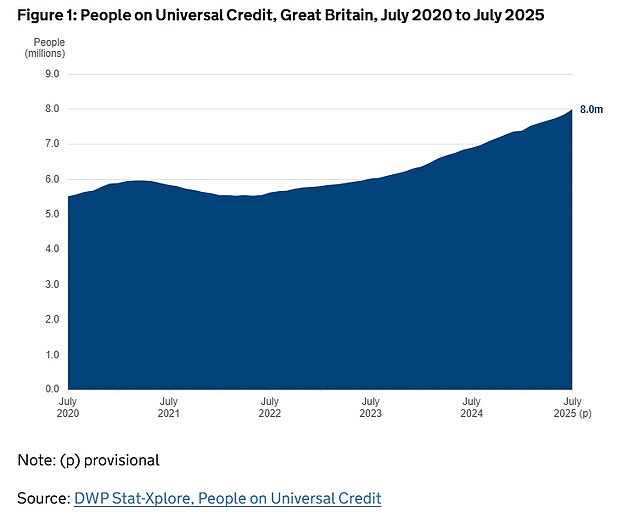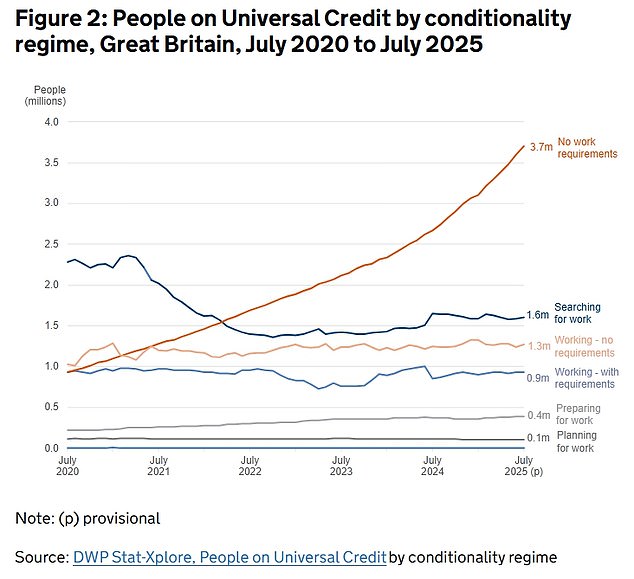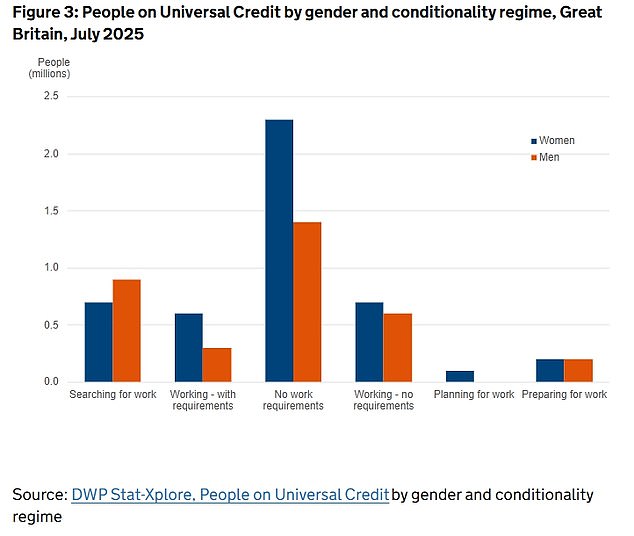There are one million more people on jobless benefits in Britain since Labour came to power last year, official data has shown.
New figures, published by the Department for Work and Pensions, showed the number of people claiming Universal Credit hit 8 million last month.
This is the highest level since the benefit was first introduced in 2013 and compares to the 6.9 million people who were on Universal Credit in July 2024.
Universal Credit is a payment to help with living costs and is available for people in work who are on low incomes, but also those who are out of work or cannot work.
The steep rise in the number of claimants over the past 12 months has been driven almost entirely by people who are not required to work.
The number of people on Universal Credit with ‘no work requirements’ reached 3.7 million in July this year – an increase of 39 per cent or 1 million since July 2024.
It means 46 per cent of all Universal Credit claimants are not expected to do anything to prepare or to look for work.
This can include those in full-time education, over the state pension age, someone with a child aged under one, and those considered to have no prospect of work.

The number of people claiming Universal Credit has hit a record high of 8 million – and nearly half of those on the benefit are not required to look for work

The number of people on Universal Credit with ‘no work requirements’ reached 3.7 million in July this year – an increase of 39 per cent or 1 million since July 2024

It means 46 per cent of all Universal Credit claimants are not expected to do anything to prepare or to look for work
The number of working people on Universal Credit rose to 2.2 million last month, up slightly from 2.1 million in July last year.
Sir Keir Starmer last month saw his attempt to cut Britain’s ballooning benefits bill derailed by a major rebellion among Labour MPs.
The Prime Minister was forced to scrap most of his planned welfare changes in the face of a huge Labour revolt.
He ditched Labour’s proposed restrictions to Personal Independence Payment (PIP), which is the main disability payment in England, until after a review.
A humilated Sir Keir was instead left to push through slimmed-down legislation in the House of Commons, now only referred to as the Universal Credit Bill.
As part of the Bill, the basic Universal Credit standard allowance will rise at least in line with inflation until 2029-30.
But the health part of the benefit will be reduced for new claimants after April 2026, unless they had a severe or terminal condition, and the rate will be frozen until 2030.
Last month, a breakdown of Universal Credit claimants by immigration status was published for the first time.
DWP said it had published the data ‘following a public commitment to investigate and develop breakdowns of the UC caseload by the immigration status of foreign nationals in receipt of UC’.
The latest data for July is largely unchanged from the previous month, again showing that the majority (83.8 per cent) of claimants were British and Irish nationals and those who live or work in the UK without any immigration restrictions.
Of this group, 99.9 per cent are UK citizens and around a third were in work, DWP said.
Almost one in 10 (9.6 per cent) people on Universal Credit were those with EU Settlement Scheme settled status who have a right to reside in the UK, while 2.7 per cent were people who had indefinite leave to remain in the UK.
Refugees accounted for 1.5 per cent of Universal Credit claimants, while 0.7 per cent were people who had come by safe and legal humanitarian routes including under the Ukraine and Afghan resettlement schemes.
Around 0.9 per cent of those on Universal Credit had limited leave to remain in the UK, covering those with temporary immigration status.
The rest were either no longer receiving Universal Credit payments or had no immigration status recorded on digital systems, DWP said.
Previous figures have shown how nearly £1 in every £10 spent on Universal Credit last year was wrongly paid.
DWP admitted £6.35billion was overpaid in Universal Credit in 2024-25, which was almost 10 per cent of the £65.3billion of total expenditure on Universal Credit.












